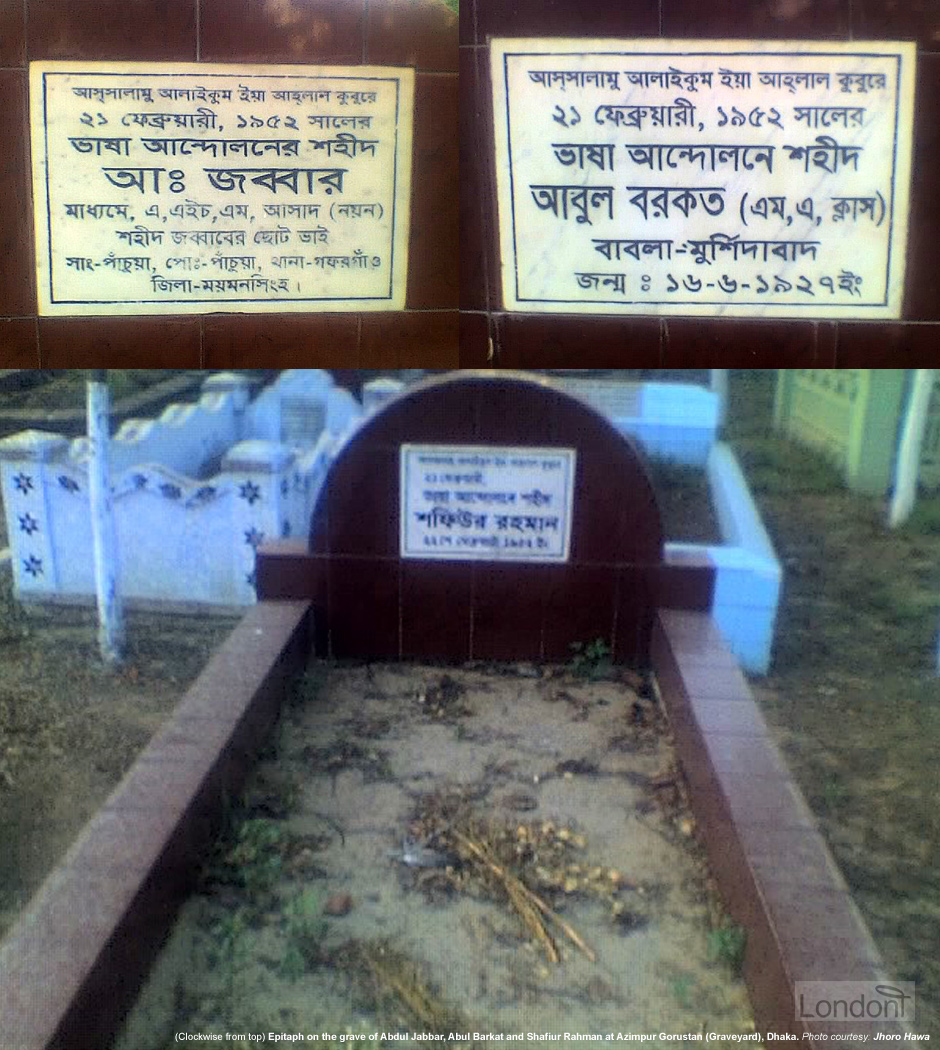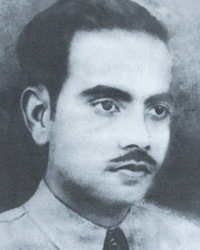
'Gayebi Janaza' leads to more killing the next day
Last updated: 5 October 2017 From the section 1952 Bhasha Andolon
Defying the curfew (announced after Ekushey February killing), the very next morning thousands of students and common people came out on city streets to protest the killings. They staged a demonstration on Nawabpur Road (Kaptan Bazaar, near Osmani Uddyan) in Dhaka demanding recognition of Bangla and participated in a gayebi janaza (funeral prayer held without the dead body) on the Medical College campus, Dhaka University and Engineering College areas. The Imam (religious leader) for this janaza was Maulana Bhashani, who had rushed back from Bogra, where he was on an organisational tour, after hearing about the Ekushey killing. Amongst those participating in the prayer for the martyred young men was Sher-e-Bangla A. K. Fazlul Huq and Abul Hashim. Prayers for the deceased were also offered at masjids (mosques) throughout the province. After the prayers were complete, the demonstrators went for a procession.
National leaders such as Maulana Bhasani took to the streets supporting the cause of the language. However, it was the students who invigorated the movement. All students' activities were centred on Dhaka University campus, later it spread among mass people and students in other divisions and districts.
After this event and until February 27th, Dhaka’s government administration was ruled according to the decisions announced from Shahidullah Hall, Dhaka University.
Amor Ekushe website
Sher-e-Bangla presided over a meeting of the Dhaka High Court Bar Association who condemned the police over their harsh action. Doctors and staff at the medical college where the injured were treated also condemned the police action. Students at educational institutions across the province lowered the national flag to half mast as a mark of respect to the martyrs. Once again, the public demonstrated and police responded. It resulted in several deaths - allegedly four - including that of a High Court Staff and a young man named Shafiur Rahman, a Law student from Dhaka University, while many others were injured and arrested. Shafiur, who was going to office on a bicycle through Nawabpur Road, was shot in the back. Taken to Dhaka Medical College and Hospital where he died at 7 pm. His dead body was buried at Azimpur gurustan (graveyard) early next morning at 3 am under police guard. As the situation deteriorates, the government calls in the military to bring the situation under control.
 Shafiur Rahman (1918 - 1952) Shaheed (Martyr) of the Bengali Language Movement. Passed I. Com examination from Calcutta Government Commercial College. Started working as a clerk at 24 Parganas civil supply office. Moved to Dhaka after 1947 Partition and joined accounts section of Dhaka High Court as a clerk. Awarded Ekushey Padak posthumously in February 2000. Son of Maulabi Mahbubur Rahman. Born in the village of Konnagar, 24 Parganas district, West Bengal (India). Killed day after Ekushey February, on 22 February 1952, aged 33-years-old. Left behind a daughter, pregnant wife and a big family dependent on his income.
Shafiur Rahman (1918 - 1952) Shaheed (Martyr) of the Bengali Language Movement. Passed I. Com examination from Calcutta Government Commercial College. Started working as a clerk at 24 Parganas civil supply office. Moved to Dhaka after 1947 Partition and joined accounts section of Dhaka High Court as a clerk. Awarded Ekushey Padak posthumously in February 2000. Son of Maulabi Mahbubur Rahman. Born in the village of Konnagar, 24 Parganas district, West Bengal (India). Killed day after Ekushey February, on 22 February 1952, aged 33-years-old. Left behind a daughter, pregnant wife and a big family dependent on his income.
Morning News had been spreading the canard of India and the communists being behind the language movement. It even reported that a large number of dhotis, the dress worn by Hindus, had been recovered in the city. The insinuation was obvious.
The tension reached the East Bengal Legislative Assembly which met for a session on that day. Maulana Abdur Rashid Tarkabagish and Khairat Hossain moved an adjournment on the incidents of Ekushey February. Khairat Hossain and Ali Ahmed Khan asked that condolences be adopted by the assembly, however, this suggestion was opposed by Chief Minister Nurul Amin. When the motions were placed in the House, they were defeated as it failed to raise the minimum numbers required for a discussion to take place.
Eventually, Nurul Amin decided to bow down to public pressure.
Nurul Amin's compromise: "Make Bangla a state language of Pakistan"
Realising the gravity of the situation and trying to limit the damage of the night before, Chief Minister Nurul Amin tabled a resolution in House for adopting Bangla as one of the state languages of Pakistan - the very first ruling Muslim League politician in office to make such a proposal.
This Assembly recommends to the Constituent Assembly of Pakistan that Bengali be one of the state languages of Pakistan.
The resolution was passed unanimously for the first time. Muslim League members broke their party rank to vote in favour of the amendments moved by the Opposition, till then consisting mostly of Hindu Congress members.
For the first time a number of Muslim members voted in favour of the amendments moved by the opposition, which so far had consisted of the Hindu Congress members only. The split in the Muslim League became formalized when some members demanded a separate bloc from the Speaker [then known as the President].
But this motion came too late to pacify the students. They wanted Nurul Amin’s insensitive administration to come to an end. Now their favourite slogan was "Khuni Nurul Amin Bichar Chai, Khuner Bangla Khun Chai" (We want justice, i.e vengeance against bloody Nurul Amin. We want blood for Bengali blood). For his part, Nurul Amin still failed to understand the language agitation as a people's movement for a legitimate demand and contended that the agitation was engineered by the communists and Hindu elements. His observation was largely based on the two articles which appeared in Swadhinata, a Kolkata-based Communist Party daily. In these articles the Communist Party had taken the credit for turning the 1952 language movement in East Pakistan into an united mass movement.
The resolution which Chief Minister Nurul Amin placed before the assembly on February 22 was shockingly devoid of any expression of condolence for those killed on the preceding day. Neither was there any indication in it of any planned investigation of the incidents by the government. The resolution was passed by an acquiescent assembly, quite naturally, because it was dominated by members belonging to the ruling Muslim League.
